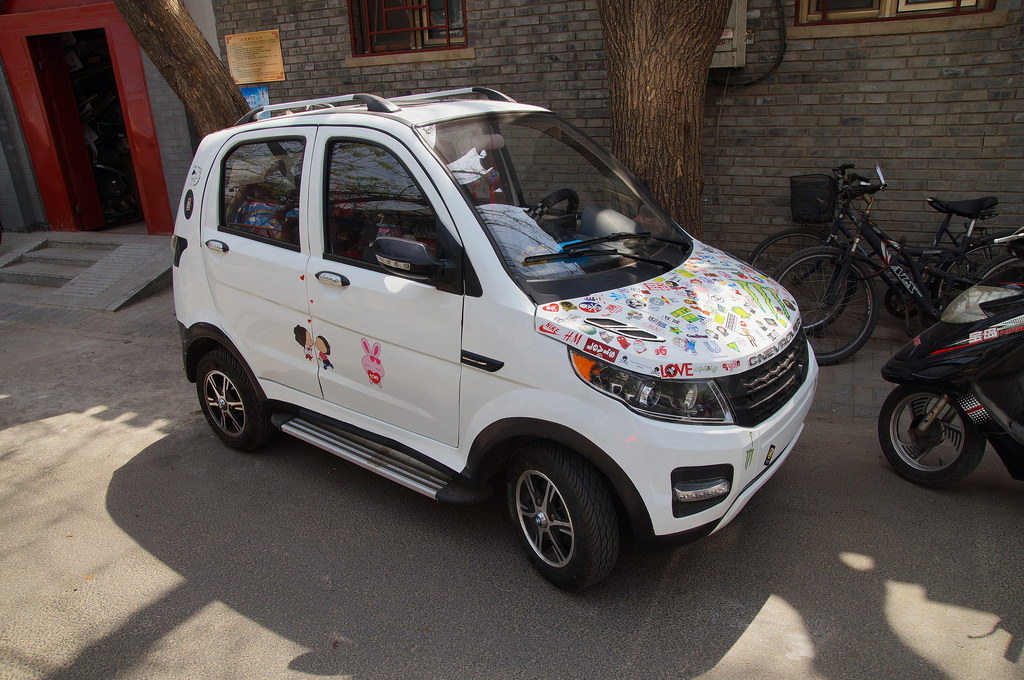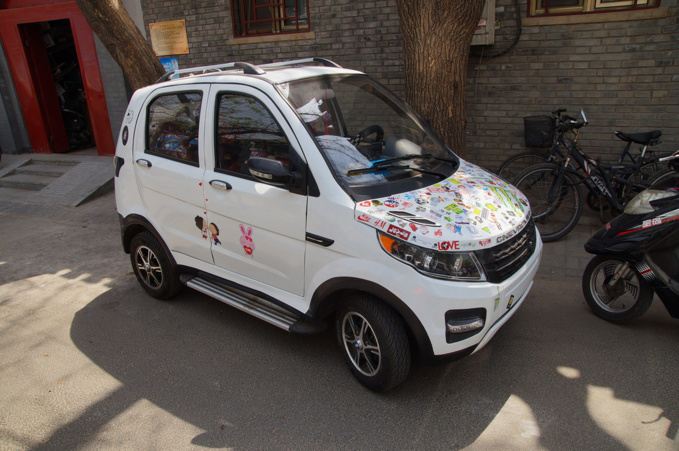A small SUV CNEV Rover, or China Electric Vehicle Rover, is manufactured and sold by several small Chinese companies, located mainly in the eastern Shandong province. Externally, these cars are very similar to Land Rover, except for size and engine. The Chinese version is tinier and runs on an electric battery. According to CNEV Rover’s specifications, the car can travel an average of 150 km at a speed of 20-60 km/h after 12-hour battery charging. The price (about £ 2 thousand, or $ 2.7 thousand) made CNEV Rover go well among the Chinese middle class. The car is much more convenient in heavy traffic flows, and driving it doesn’t require having a driver’s license.
A representative of Xuying Vehicles online auto dealer notes that these cars "save energy, are environmentally friendly and easy to manage." According to her, they haven’t had any problems with Land Rover yet. "Firstly, I think that our cars are not quite the same as Land Rover - for example, they are smaller. And secondly, we are so far away from them that maybe they will not reach us", - she said. A sales representative of Shandong Star Auto company pointed out that they sold 500 of these electric vehicles, and had no issue with Land Rover.
Manufacturers that produce these vehicles operate on small plants without a license. They advertise their products as electric cars for the elderly - something like scooters or motorcycles. Catalogs of such companies feature accurate, though much smaller copies of Jaguar, BMW, Audi and other brands. Sometimes, the manufacturers also try to add a few differences. For example, a miniature electric Audi has five rings instead of four as the German original does. An owner of one of those small car companies told The Beijing News that his company can assemble any car model.
The global automotive market is constantly evolving and growing. Manufacturers are inventing new automobiles and improving old models. It’s not surprising because global demand for cars is constantly moving the industry forward. Analysts Focus2Move agency calculated that in 2015, 89.7 million cars were sold on global car markets in total.
At the same time, more than half of sales come from three countries - China, the United States and, of course, Japan. Together, dealers in these countries took up 53.1% of global sales.
China is the main consumer, and the largest automobile market in the world. Its part is 27.7%, which means that almost every fourth car is sold in China. In total, the country sold 24.5 million cars in 2015 (growth of 4.9%). Daily sales in China account for 67 thousand cars.
source: thetimes.co.uk
A representative of Xuying Vehicles online auto dealer notes that these cars "save energy, are environmentally friendly and easy to manage." According to her, they haven’t had any problems with Land Rover yet. "Firstly, I think that our cars are not quite the same as Land Rover - for example, they are smaller. And secondly, we are so far away from them that maybe they will not reach us", - she said. A sales representative of Shandong Star Auto company pointed out that they sold 500 of these electric vehicles, and had no issue with Land Rover.
Manufacturers that produce these vehicles operate on small plants without a license. They advertise their products as electric cars for the elderly - something like scooters or motorcycles. Catalogs of such companies feature accurate, though much smaller copies of Jaguar, BMW, Audi and other brands. Sometimes, the manufacturers also try to add a few differences. For example, a miniature electric Audi has five rings instead of four as the German original does. An owner of one of those small car companies told The Beijing News that his company can assemble any car model.
The global automotive market is constantly evolving and growing. Manufacturers are inventing new automobiles and improving old models. It’s not surprising because global demand for cars is constantly moving the industry forward. Analysts Focus2Move agency calculated that in 2015, 89.7 million cars were sold on global car markets in total.
At the same time, more than half of sales come from three countries - China, the United States and, of course, Japan. Together, dealers in these countries took up 53.1% of global sales.
China is the main consumer, and the largest automobile market in the world. Its part is 27.7%, which means that almost every fourth car is sold in China. In total, the country sold 24.5 million cars in 2015 (growth of 4.9%). Daily sales in China account for 67 thousand cars.
source: thetimes.co.uk



















